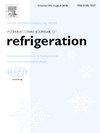Frost-EffNet: A deep learning model for frost detection in refrigeration systems
IF 3.8
2区 工程技术
Q1 ENGINEERING, MECHANICAL
International Journal of Refrigeration-revue Internationale Du Froid
Pub Date : 2025-09-25
DOI:10.1016/j.ijrefrig.2025.09.029
引用次数: 0
Abstract
Frost accumulation on the heat exchange units in refrigeration systems significantly impairs performance by restricting airflow, leading to increased power consumption. Despite its impact, the accurate and timely detection of frost buildup remains a challenging task, hindering the efficient initiation and control of defrost mechanisms. This study introduces Frost-EffNet, an innovative model to predict frost accumulation on refrigeration unit evaporator coils. Frost-EffNet is a modified version of the EfficientNet architecture. The model was validated using five distinct EfficientNet variants, with performance evaluated on a dataset of evaporator coil images. Comparative analysis was conducted by varying key hyperparameters to identify the optimal configuration for the best-performing model. Additionally, Grad-CAM (Gradient-weighted Class Activation Mapping) analysis was employed to highlight the areas of the evaporator coil that the model focused on for frost estimation, providing valuable insights into the model’s decision-making process. The proposed Frost-EffNet model demonstrated high predictive accuracy, achieving 92.47 % accuracy on the test dataset, with a mean absolute error (MAE) of 0.11 mm. A comparative performance analysis revealed that Frost-EffNet outperforms other convolutional neural network (CNN) models in terms of accuracy, while also being computationally more efficient.
frost - effnet:制冷系统霜冻检测的深度学习模型
在制冷系统中,热交换装置上的霜积累通过限制气流而显著损害性能,导致功率消耗增加。尽管有其影响,但准确及时地检测结霜仍然是一项具有挑战性的任务,阻碍了有效启动和控制除霜机制。本文介绍了一种预测制冷机组蒸发器盘管结霜量的创新模型frost - effnet。Frost-EffNet是effentnet架构的修改版本。使用五种不同的effentnet变体验证了该模型,并在蒸发器盘管图像数据集上评估了该模型的性能。通过不同的关键超参数进行对比分析,以确定最佳性能模型的最佳配置。此外,采用梯度加权类激活映射(Gradient-weighted Class Activation Mapping, Grad-CAM)分析来突出显示模型关注的霜估计区域,为模型的决策过程提供有价值的见解。所提出的Frost-EffNet模型具有较高的预测精度,在测试数据集上达到92.47%的准确率,平均绝对误差(MAE)为0.11 mm。对比性能分析显示,Frost-EffNet在精度方面优于其他卷积神经网络(CNN)模型,同时计算效率也更高。
本文章由计算机程序翻译,如有差异,请以英文原文为准。
求助全文
约1分钟内获得全文
求助全文
来源期刊
CiteScore
7.30
自引率
12.80%
发文量
363
审稿时长
3.7 months
期刊介绍:
The International Journal of Refrigeration is published for the International Institute of Refrigeration (IIR) by Elsevier. It is essential reading for all those wishing to keep abreast of research and industrial news in refrigeration, air conditioning and associated fields. This is particularly important in these times of rapid introduction of alternative refrigerants and the emergence of new technology. The journal has published special issues on alternative refrigerants and novel topics in the field of boiling, condensation, heat pumps, food refrigeration, carbon dioxide, ammonia, hydrocarbons, magnetic refrigeration at room temperature, sorptive cooling, phase change materials and slurries, ejector technology, compressors, and solar cooling.
As well as original research papers the International Journal of Refrigeration also includes review articles, papers presented at IIR conferences, short reports and letters describing preliminary results and experimental details, and letters to the Editor on recent areas of discussion and controversy. Other features include forthcoming events, conference reports and book reviews.
Papers are published in either English or French with the IIR news section in both languages.

 求助内容:
求助内容: 应助结果提醒方式:
应助结果提醒方式:


